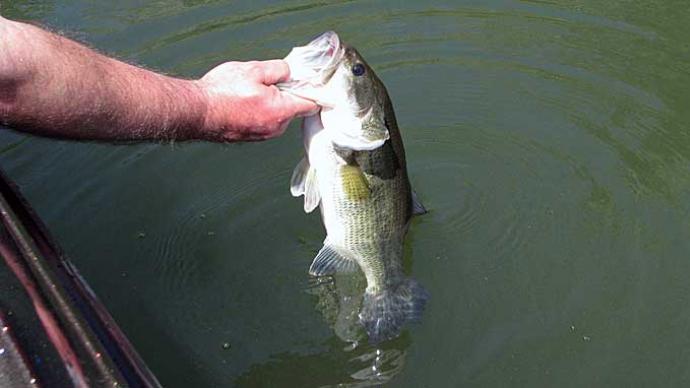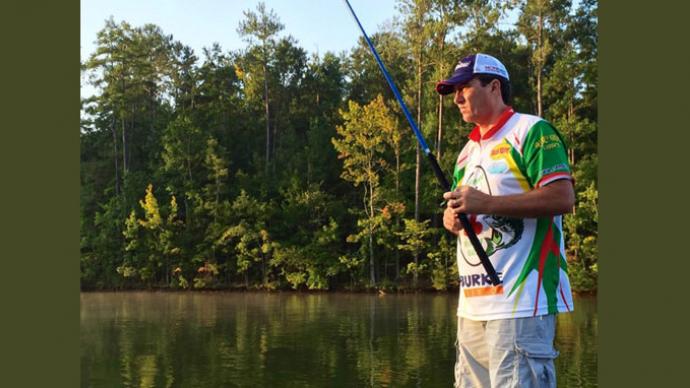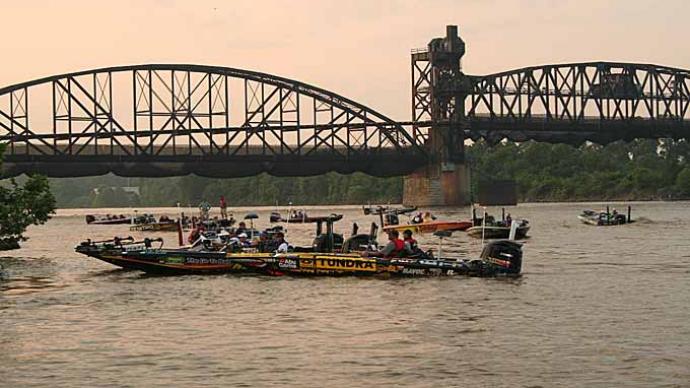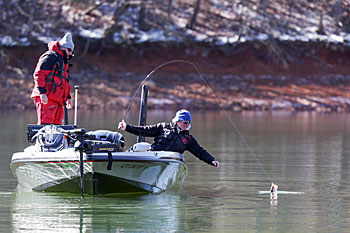
Professional bass anglers on the Bassmaster Elite Series and FLW Tour make fishing look easy. They catch bass after bass from bodies of water across the country. But when you make your living with hook and line, that’s what you need to do.
While some of their success results from natural talent, pros also approach fishing differently than weekend anglers. By recognizing those differences and then applying them to their fishing, weekend anglers can also make catching bass look easy.
Small tweaks
“A lot of people have a big misconception about tour anglers,” said Bassmaster Elite Series angler Justin Lucas, a California native who now calls Alabama home. He said they think pros spend hours in their workshops, tinkering with lures, modifying the ones found on store shelves to give them super fishing-catching abilities. In reality, most of that work is done to the prototypes that become the lures you find at your local tackle shop. Lure designers and pros spend countless hours perfecting lures, so they catch bass right out of the box. “[Most pros] are going to fish it right out of the package,” he said. “I can compete on the Bassmaster Elite Series without having to do all [those modifications].” And while soft-plastic lures go straight from the package to the hook, that doesn’t mean hard baits go entirely untouched.
Lucas said most pros would swap out split rings and hooks. That’s done for one simple reason: minimizing fish loss. “You need to do everything you can to avoid losing fish,” he said. “We all do [lose fish], but mine has been minimal the past few years.” Lucas hasn’t been any Elite Series wins during that time, but enough consistency for him to finish 11th in the 2014 Bassmaster Elite Series Angler of the Year race and qualify for the 2015 Bassmaster Classic, which was held on Lake Hartwell.
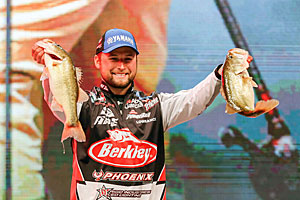
Most lures come with cheaper-grade trebles. He replaces them with higher-quality ones that stay sharper longer and are less likely to bend or break under a load of a thrashing big bass. He also chooses slightly bigger hooks and split rings that bring extra strength, especially for lures that generate a lot of resistance, such as swimbaits and big crankbaits, but is careful not to go so large that the lure’s action is affected. He won’t choose larger components on lures such as jerkbaits because they are fished on a limber rod, which has enough give to protect original size parts.
FLW Tour pro Jacob Wheeler agrees with Lucas. The Indiana pro not only swaps hooks on new lures, but he also changes them after catching three or four bass, especially when cranking rocks. That can dull even the best hooks. He says it’s an example of how pros pay attention to small details in equipment that weekend anglers may bypass as they maximize their time on the water. “You have a great rod, a great line, but rusted hooks. Now you lose a 7-pounder that can win the tournament because you weren’t paying attention,” he said.
That attention to small details goes to other tackle boxes and the rod locker. Lucas carries a box of jig heads and a box of skirts. “Everywhere you go, you don’t know what the water will be,” he said. So he matches jig weight and hook size and color to conditions once he arrives. He has football-head jigs with 4/0 hooks and 5/0 hooks, for example. The bigger ones are especially for Tennessee River lakes, where pulling them across ledges is a popular big-bass technique. He can add a skirt to match water color or forage. He also will remove the skirt from his vibrating jigs and thread on a swimbait such as a Berkley Havoc Grass Pig. “It shows them something different, especially if I’m targeting fish that are targeting shad,” he said.
Lucas fishes the heaviest rod he can get away with, which usually is a power or two heavier than what weekend anglers select. He wants to ensure his hook penetrates a bass’s mouth when he sets the hook. He feels the popular parabolic bend rods don’t have enough power to set hooks. Once he has a bass hooked, the heavier-power rod helps him bring it straight to the boat and into the livewell without having to play it around the boat several times. He also uses reels with high gear ratios. “There’s a huge difference between a reel that brings in 37 inches per handle turn and one that brings in 26 inches,” he said. “That’s almost a foot per crank.” That keeps slack out of the line and bass hooked when they swim toward the boat.
Invest in preparation
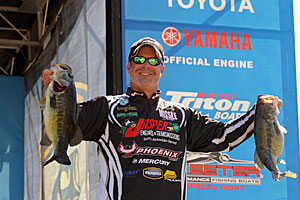
Paul Mueller has twice climbed through the B.A.S.S. Nation ranks — from club derbies in his home state of Connecticut to the Bassmaster Classic — and is a rookie on the 2015 Bassmaster Elite Series. That’s a big jump in the competition level. “As you bridge that gap [from weekend angler to pro], you are constantly trying to get better,” he said. “When you fish the Elite Series, and you have a weakness, and they go to a body of water where that weakness is a prominent pattern, that weakness will be exposed.” It’s incredibly challenging to learn new bodies of water quickly, and that’s a large part of what he and other Elite Series rookies must overcome. It’s similar to what weekend anglers face when carving fishing time out of schedules filled with work, family activities, and other hobbies and interests. He believes preparation overcomes time limitations.
Mueller’s fishing resumes back up his belief. His most significant tournament accomplishments have come at bodies of water more than 1,000 miles from his home, making frequent practice trips unfeasible. He was the top Eastern Division angler at the 2013 B.A.S.S. Nation National Championship on Lake Dardanelle in Arkansas, qualifying him for the 2014 Bassmaster Classic on Lake Guntersville in Alabama, where he set the single-day weight record of 32 pounds and 3 ounces. He won the 2014 B.A.S.S. Nation Championship on the Ouachita River in Monroe, La., sending him to his second Classic.
But even before leaving his driveway for those events, Mueller spent hours studying lake maps and researching the best ways to catch bass at each venue. “Regardless of skill level, you have to be willing to learn,” he said. That includes when he’s on the water guiding between tournaments. Making decisions improves angling skills, whether ensuring clients catch fish or filling out a tournament limit.
Mueller says preparation applies to learning techniques, too. Take cranking, for example. It’s more attached to Southern reservoirs than Nutmeg State natural lakes. But he has become proficient at it over the past five years. Not only is it a great way to catch bass, he said, but it uncovers what bass are holding around. He said it might not be the winning technique for a particular tournament, but the information it provides can offer a clue to the right one. “[Cranking] can tell you a lot,” he said. “It can tell you what’s down there. It can tell you what they are relating to.”
Fish fast
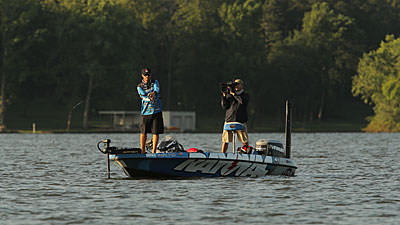
Wheeler’s hometown hosts the biggest auto race in the world — the Indianapolis 500. And while he doesn’t fish fast enough to qualify for its starting grid, he believes speed is an integral part of how pros fish. They understand how to cover water quickly and efficiently, he said, as they search for tournament-winning schools of bass.
Wheeler, whose resume includes a Forrest Wood Cup, Walmart Bass Fishing League All-American crown, Bassmaster BASSfest win, and Ultimate Match Fishing championship, said fishing fast reveals patterns sooner. He fishes coves, for example, from the main-lake points to the back during practice. If he catches one or two from docks on the shallow flat in the back of a cove, then repeats it in the next, he’s onto something. But that doesn’t mean he takes his foot off the accelerator. He wants to develop as many bass-catching strategies as he can, so he’ll have choices when — not if — conditions change during the tournament.
He said his best tournaments came after an awful practice, forcing him to fish completely different during the competition days. “You can’t get caught up with last weekend,” he said. Weekend anglers don’t have a lot of time to practice. It might be limited to the weekend before the tournament. “It’s 70 degrees and sunny [then], and now it’s 30 degrees: It’s going to be different,” he said. “You must adjust to the current conditions, so most times, it’s gut feelings.” The faster he fishes, the more water he covers and the situations he experiences.
Time on the water
Illinois native and soon-to-be Missouri resident Chad Morgenthaler can easily see one difference between pros and weekend anglers. Still, it might be the most difficult for weekend anglers to overcome. And that’s the benefit of spending more time on the water. It’s the best way he knows to develop an angler’s bass-finding and -catching instincts.
Morgenthaler said that on the water, anglers pick up tricks for catching bass and gain confidence in their skills. That leads to fishing according to gut-level instincts and not questioning on-the-water moves or overthinking situations. It also builds a bank of experiences they can reference on future trips. This all played a role for him in a 2015 Bassmaster Southern Open tournament. “At Lake Toho, I knew at 10:30 that if I could stay with what I was doing, I was going to get the opportunity to get a big bite,” the Bassmaster Elite Series angler said. Conditions were changing quickly, and he reacted to the moment based on experience. That led to a win and a ticket to the 2016 Bassmaster Classic on Oklahoma’s Grand Lake.
While Morgenthaler believes there is no substitution for time on the water, there are ways to make better use of weekend anglers' time. Thanks to the Internet, cable television, and print publications, a wealth of bass-fishing information is available in various formats: audio, articles, photos, and videos. Apply that information correctly when you are on the water, he said, and it can help you find and catch more bass. “It’s like a college degree,” he said of off-the-water research. “It’s a guideline to get you started. Then you must put the time in to become dialed in on what you want to do as an occupation. Fishing is no different.”


